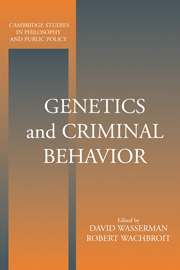1 - Introduction: Methods, Meanings, and Morals
Published online by Cambridge University Press: 05 June 2012
Summary
The ambition to explain and predict criminal behavior scientifically has defined the field of criminology and inspired a vast number of studies in psychology, sociology, and economics. As central as this ambition has been to a wide variety of research programs, it has been called into question by those who doubt that criminal behavior is susceptible to scientific explanation or prediction or who worry that the desire to explain and predict masks a desire for pervasive social control. The recent pursuit of this ambition by human geneticists has inspired particularly strong hopes and fears. The success of genetics in understanding human disease suggests that it could be a powerful tool in the scientific investigation of human behavior, including criminal behavior. At the same time, the checkered history of human genetics suggests that it can easily be abused, misrepresented, or misunderstood, regardless of the validity of the studies or the motivation of the researchers.
At present, a variety of research programs investigates genetic influences on human behaviors, dispositions, and mental traits. Heritability studies seek to tease out genetic from environmental effects on human behavioral differences, largely by examining twins and adoptees; molecular researchers look for markers, and ultimately genes, associated with crime and violence; neurobiologists explore causal pathways by which genetic variations may affect aggressive and impulsive behavior (see generally Raine 1993; Reiss and Roth 1994; Stoff and Cairns 1996; Sherman et al. 1997).
- Type
- Chapter
- Information
- Genetics and Criminal Behavior , pp. 1 - 22Publisher: Cambridge University PressPrint publication year: 2001
- 2
- Cited by

